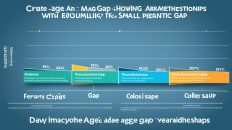Have you ever found yourself drawn to someone who is significantly older or younger than you? Perhaps you’ve experienced the undeniable pull of connection, even in the face of societal norms and judgments. Age gap relationships, though sometimes frowned upon, can hold a deep and profound significance in the lives of those involved. As a society, we often overlook the emotional complexities that come with navigating such relationships, but it’s crucial to explore the psychological aspects at play.
Age gap relationships psychology delves into the intricate dynamics and challenges faced by couples with significant age differences. It’s a topic that requires sensitivity and a deep understanding of human psychology. From emotional maturity and priorities to end-of-life concerns and social stigma, there are numerous factors at play that can impact the well-being and compatibility of age gap couples.
Join us on this journey as we explore the psychological aspects of age gap relationships and delve into the complexities and realities that couples face. Whether you’re currently in an age gap relationship, contemplating entering one, or simply curious about the emotional dynamics involved, this exploration will provide valuable insights and perspectives.
Key Takeaways:
- Age gap relationships psychology explores the emotional complexities faced by couples with significant age differences.
- Factors such as emotional maturity, priorities, end-of-life concerns, and social stigma can impact the well-being and compatibility of age gap couples.
- Understanding the psychological aspects of age gap relationships can help individuals navigate the challenges and experiences that come with such partnerships.
- Open communication, setting boundaries, and seeking support are key to overcoming the unique challenges faced in age gap relationships.
- Age should not be the sole determining factor for relationship success; factors such as mutual values, goals, and commitment play a more significant role.
Emotional Maturity in Age Gap Relationships
Age gap relationships can sometimes lead to differences in emotional maturity, especially when there is a significant gap in life experiences. The partner who is more mature may end up carrying a heavier emotional load, which can potentially lead to exhaustion and strain on the relationship.
When there is a maturity gap in relationships, it is essential to acknowledge and address the impact it can have on emotional well-being. The partner who is less emotionally mature may rely on their more mature counterpart for guidance and support, placing an additional burden on them.
Communication is crucial in navigating the emotional load in age gap relationships. By openly discussing their feelings, needs, and expectations, partners can find ways to balance the distribution of emotional labor and work together towards a healthier, more equitable relationship.
It is important for both partners to recognize that emotional maturity is not solely determined by age. Individuals of the same age can have varying levels of emotional maturity, while those with an age difference can still display compatibility in this aspect. Understanding and respecting each other’s emotional journey can ultimately foster a deeper connection and mutual growth.
Managing Emotional Load:
Here are some tips for managing the emotional load in age gap relationships:
- Open Communication: Creating a safe space to express emotions, concerns, and needs can help distribute the emotional load more evenly.
- Setting Boundaries: Establishing boundaries and expectations can prevent one partner from taking on excessive emotional responsibility.
- Seeking Support: Engaging in individual or couples therapy can provide tools and guidance for addressing emotional challenges in a constructive and supportive environment.
- Nurturing Individual Growth: Encouraging personal development and self-reflection can contribute to the emotional well-being of both partners, reducing the burden on one individual.
Understanding the impact of emotional maturity in age gap relationships is crucial for creating a balanced and fulfilling partnership. By actively addressing and managing the emotional load, couples can strengthen their bond, promote personal growth, and navigate the unique dynamics of their relationship with empathy and resilience.
Priorities in Age Gap Relationships
Couples with a significant age difference often face unique challenges that arise from differences in priorities. These differences can encompass various aspects of life, including:
- Health and Energy Levels: Partners in age gap relationships may have disparities in their physical health and energy levels. While one partner may be in the prime of their life, the other may be dealing with the natural effects of aging. This difference can have an impact on the activities they enjoy, their ability to travel or engage in physical pursuits together, and even their overall lifestyle choices.
- Phase-of-Life Differences: Another aspect of priorities affected by age gap relationships is phase-of-life differences. Each partner may be in different stages of their life journey, with varying personal and professional goals. For example, one partner may be focused on establishing a career or pursuing further education, while the other may be planning for retirement or transitioning into a different phase of their career. These differing priorities can lead to challenges in terms of time allocation, financial decisions, and long-term plans.
- Family Planning: Starting a family is a significant consideration for many couples. In age gap relationships, partners may have different desires or abilities when it comes to having children. The younger partner may still be interested in starting a family, while the older partner may already have children or may not be interested in becoming a parent again. This difference in priorities can potentially create tension and decision-making dilemmas for the couple.
To navigate these challenges, open and honest communication is crucial. Discussing priorities, goals, and expectations openly can help both partners gain a deeper understanding of each other’s needs and aspirations. It allows for a mutual exploration of compromises and finding common ground that respects the unique circumstances of the relationship.

By aligning priorities, age gap couples can work together to find creative solutions and make informed decisions that foster a fulfilling relationship. It allows them to genuinely support each other’s individual goals while also nurturing the shared goals and aspirations they have as a couple.
End-of-Life Concerns in Age Gap Relationships
Age gap relationships bring unique challenges, including concerns about the future and the fear of being left alone. These end-of-life concerns can weigh heavily on the minds of both partners. However, by addressing these concerns openly and making arrangements for the future, couples can find reassurance, support, and peace of mind.
One of the main fears in age gap relationships is the prospect of outliving a partner. The older partner may worry about leaving their younger partner alone and vulnerable. This fear can be particularly strong when there is a significant age difference, as the older partner may be closer to the end of their life than their younger counterpart. It can be a daunting thought to imagine navigating the later years without the presence and support of a beloved partner.
Communication is key when it comes to end-of-life concerns in age gap relationships. Both partners should openly discuss their fears, anxieties, and expectations for the future. By expressing these concerns in a safe and supportive environment, couples can find comfort in the fact that their feelings are heard and understood. This communication can also lead to making arrangements for the future, such as financial planning, healthcare decisions, and creating a support system.
“I know that the thought of me potentially being alone is something that worries my partner. We’ve had many honest conversations about it, and it has helped us both feel more secure. We’ve also made legal arrangements and discussed our end-of-life wishes, which gives us peace of mind.” – Sarah, 54
Making arrangements for the future is an important step for age gap couples. This can include creating a will, setting up power of attorney, and discussing healthcare directives. By taking these proactive steps, couples can ensure that their wishes are respected and that their partner is protected in the event of the older partner’s passing.
In addition to legal arrangements, building a support network is crucial for age gap couples. This can involve connecting with other age-discrepant couples who can relate to their experiences and provide guidance. Seeking counseling or therapy can also be beneficial, as it offers a safe space to explore emotions, fears, and concerns related to end-of-life issues.
Overall, addressing end-of-life concerns in age gap relationships requires open communication, making arrangements for the future, and seeking support when needed. By doing so, couples can alleviate anxiety, strengthen their bond, and face the future with confidence.
Research Findings on Age Gap Relationships
When it comes to age gap relationships, research studies have provided valuable insights into the dynamics and satisfaction levels of couples. While cultural norms may vary, it is interesting to explore how different age gaps impact relationship satisfaction.
Evaluating Satisfaction Levels
According to research, age gaps of 1 to 3 years are generally considered ideal in many cultures. However, when the age difference is larger, couples may experience a decline in relationship satisfaction over time.
“Love knows no age,” but it is essential to acknowledge that significant age disparities can introduce unique challenges within a relationship.
Despite potential satisfaction declines, it is important to note that successful age gap relationships exist. Several factors contribute to maintaining a healthy and fulfilling connection.
Factors Influencing Relationship Success
Strong communication skills, education level, and financial security are key components deemed influential in sustaining age gap relationships. While age difference is a contributing factor, its impact can be mitigated by prioritizing effective communication and nurturing these critical aspects.
A study conducted by Johnson et al. (2019) surveyed couples in age gap marriages, focusing on relationship satisfaction levels and the impact of age difference. Findings revealed that couples with higher education levels, stable financial situations, and excellent communication skills reported higher relationship satisfaction rates, even with larger age gaps.
Communication: The Key to Success
Effective communication acts as a bridge for understanding and overcoming the challenges posed by age differences. Open and honest dialogue allows couples to express their needs, expectations, and concerns, fostering mutual understanding and connection.
Furthermore, a study by Robertson et al. (2020) highlighted the importance of communication skills in age gap relationships. Couples who actively engaged in open and respectful communication reported higher relationship satisfaction and overall happiness.
The Role of Education and Financial Security
Education and financial security play vital roles in age gap relationships. When both partners have similar educational backgrounds and financial stability, it reduces potential conflicts related to life goals, aspirations, and decision-making processes.
Education and financial security serve as common ground, enabling age gap couples to align their priorities and build a strong foundation for a successful future together.
By focusing on these elements, couples can overcome challenges associated with age difference and ensure their relationship remains fulfilling and supportive.
Research Findings Summary
To summarize, the research findings emphasize that a successful age gap relationship is not solely determined by the age difference. Instead, factors such as effective communication, education, and financial security are critical for fostering relationship satisfaction and longevity.
Couples should be aware of the potential challenges that may arise from age disparities and proactively address them through open dialogue, mutual understanding, and nurturing shared goals. By incorporating these findings into their relationships, age gap couples can confidently navigate the ups and downs, building a strong and satisfying connection.
Social Stigma of Age Gap Relationships
Age gap relationships often face social stigma and judgment from others. Society tends to hold certain stereotypes and biases against age gap relationships, which can create unnecessary challenges for couples.
One common stereotype associated with age gap relationships is the perception of one partner being a “sugar daddy” or a “gold-digger.” This stereotype assumes that the younger partner is only interested in the financial benefits or material possessions that the older partner can provide. Such stereotypes can lead to judgment, criticism, and the belief that the relationship is solely driven by monetary interests.
It is important for age gap couples to address these stereotypes and not let them dictate their relationship dynamics. It is crucial to remember that love, companionship, and emotional connection can thrive in relationships regardless of age difference.
“Age is just a number. What truly matters is the love and understanding between two people.”
Ignoring ignorant opinions and setting boundaries with judgmental loved ones can help overcome social stigma. It is vital for age gap couples to focus on their own happiness and the strength of their relationship, rather than seeking validation from others. Building a support network of like-minded individuals who have experienced similar social stigma can also provide encouragement and guidance.
To shed light on the social stigma surrounding age gap relationships, let’s take a look at the following table:
| Stigma | Description |
|---|---|
| Stereotype: Sugar Daddy | Assumes older partner is only interested in providing financial support. |
| Stereotype: Gold-digger | Assumes younger partner is only interested in material possessions. |
| Judgment | Criticism and disapproval from others due to the age difference. |
| Discrimination | Exclusion or mistreatment based on societal biases against age gap relationships. |
Overcoming social stigma requires resilience, self-confidence, and a strong belief in the legitimacy of age gap relationships. By focusing on the love and connection they share, age gap couples can navigate societal judgment and build a fulfilling and long-lasting relationship.
Power Imbalance in Age Gap Relationships
Age gap relationships can sometimes result in power imbalances, where the older partner assumes an authoritative role or uses financial dependence as a means to exert control. This power dynamic can create challenges and strain the relationship.
When one partner holds more power and control, it can lead to feelings of inequality and dissatisfaction. The authoritative role of the older partner may overshadow the opinions and needs of the younger partner, hindering open communication and mutual decision-making.
“The power imbalance in age gap relationships can be detrimental to the emotional well-being and overall satisfaction of both partners. It is essential to address this issue and find ways to restore balance in the relationship.”
Financial control is another aspect that can contribute to power imbalances in age gap relationships. The older partner may have more financial resources and therefore hold greater control over financial decisions, which can impact the autonomy and independence of the younger partner.
However, it is important to recognize and address these power imbalances to promote a healthy and egalitarian relationship. Open communication plays a crucial role in resolving power struggles and creating a safe space for both partners to express their needs and concerns.
Setting boundaries is also essential in establishing a balanced dynamic. Both partners should have equal say and decision-making power, regardless of age or financial status. This helps prevent one partner from dominating the relationship and fosters mutual respect and cooperation.
If the power imbalance in an age gap relationship becomes overwhelming or difficult to navigate, seeking professional help, such as couples counseling or therapy, can provide valuable guidance and support. A trained therapist can assist in addressing underlying issues and facilitating effective communication strategies.
Finding Balance and Nurturing Equality
It is crucial for age gap couples to actively work towards maintaining a healthy power dynamic based on equality and mutual consent. Here are some strategies that can help:
- Educate yourselves about power dynamics in relationships and discuss how it manifests in your own relationship
- Regularly engage in open conversations about expectations, boundaries, and decision-making
- Encourage and validate each other’s opinions and perspectives
- Seek professional help if power imbalances persist or cause distress
- Continue to develop individual strengths and skills to foster independence and empowerment
By addressing power imbalances and promoting equality, age gap relationships can thrive and flourish, allowing both partners to feel valued, respected, and heard.

Overcoming Challenges in Age Gap Relationships
Age gap relationships can present unique challenges that require effort and understanding from both partners. By implementing certain strategies and seeking support, couples can navigate these challenges and build a strong, fulfilling relationship.
Setting Boundaries
Establishing clear boundaries is essential in age gap relationships. Both partners should openly communicate their needs, expectations, and limitations. This helps create a sense of respect, trust, and understanding between them. Boundaries can be set regarding personal space, time spent with friends and family, and decision-making processes. By setting boundaries, couples can maintain their independence while also fostering a healthy relationship dynamic.
Open Communication
Open and honest communication is crucial in overcoming challenges in age gap relationships. Both partners should feel safe expressing their thoughts, feelings, and concerns without judgment or criticism. Regular check-ins and proactive discussions about important topics such as finances, future plans, and family dynamics can help prevent misunderstandings and foster a deeper connection. Effective communication enables couples to navigate the complexities that may arise due to the age difference.
Building a Support Network
Finding a support network of age-discrepant couples can be immensely helpful in overcoming challenges. Connecting with other couples who have faced similar experiences allows for sharing of advice, insights, and coping strategies. It provides a supportive environment where partners can feel understood and validated. Online communities, social media groups, and local support groups are excellent resources for finding like-minded individuals who can offer guidance and encouragement.
Seeking Counseling
If the challenges become overwhelming or persistently difficult to navigate, seeking professional counseling can provide valuable guidance. A trained therapist can help couples explore their unique dynamics, improve communication strategies, and develop healthy coping mechanisms. Counseling offers a safe space for both partners to address their concerns, work through conflicts, and strengthen their relationship. With the guidance of a counselor, couples can gain new insights and develop skills to overcome specific challenges related to their age gap.
By setting boundaries, practicing open communication, finding a support network, and seeking counseling when needed, couples can overcome the challenges that may arise in age gap relationships. With dedication, patience, and understanding, they can build a strong and lasting connection based on mutual respect and love.
| Strategies for Overcoming Challenges in Age Gap Relationships |
|---|
| Setting Boundaries |
| Open Communication |
| Building a Support Network |
| Seeking Counseling |
Age Gap Relationships and Relationship Success Factors
Relationship success in age gap relationships is influenced by various factors. While the age difference is a significant aspect, it is not the sole determining factor for the success of these relationships. Several other factors come into play, shaping the dynamics and outcomes of age gap relationships.
Factors Influencing Relationship Success
1. Education Level:
Having similar levels of education can facilitate better understanding and intellectual compatibility between partners in an age gap relationship. It promotes stimulating conversations and shared interests.
2. Financial Security:
Financial stability is crucial in any relationship. In age gap relationships, it can be even more critical due to potential differences in income and retirement plans. Mutual trust and transparency regarding financial matters contribute to a secure foundation.
3. Attachment Style:
One’s attachment style, whether it be anxious, avoidant, or secure, influences the way they relate to their partner. It can impact the overall satisfaction and stability of the relationship. Open communication and a secure attachment style can foster a strong emotional bond.
4. Communication Skills:
Effective communication is vital in all relationships, including age gap relationships. It allows partners to express their needs, resolve conflicts, and understand each other better. Honesty, active listening, and empathy contribute to healthy communication dynamics.
5. Emotional Intelligence:
Emotional intelligence plays a significant role in fostering emotional connection and understanding between partners. It involves the ability to recognize and manage emotions in oneself and others. Emotional intelligence promotes empathy, problem-solving, and emotional support in the relationship.
6. Satisfaction with Sex Life:
A satisfying sex life is an essential component of a healthy relationship. It involves mutual desire, intimacy, and sexual compatibility. Open communication, exploration, and mutual consent contribute to a fulfilling sexual relationship.

Factors Influencing Relationship Success in Age Gap Relationships
| Factors | Description |
|---|---|
| Education Level | Similar levels of education promote intellectual compatibility and shared interests. |
| Financial Security | Mutual trust and transparency in financial matters contribute to a secure foundation. |
| Attachment Style | Open communication and a secure attachment style foster a strong emotional bond. |
| Communication Skills | Effective communication enhances understanding, conflict resolution, and emotional connection. |
| Emotional Intelligence | Emotional intelligence promotes empathy, problem-solving, and emotional support. |
| Satisfaction with Sex Life | A fulfilling sexual relationship involves open communication, exploration, and consent. |
While these factors contribute to relationship success, it is important to remember that every relationship is unique. Age gap relationships require effort, understanding, and compromise from both partners. By nurturing these essential factors, age gap couples can create a strong and fulfilling connection.
Factors Influencing Age Gap Couples
Age gap couples are influenced by various factors, including evolutionary explanations and cultural and societal developments. These factors shape the dynamics and perceptions surrounding age difference in relationships.
Evolutionary Explanations
Evolutionary theories suggest that men are often attracted to younger women due to their reproductive fitness. Younger women may be seen as more likely to bear healthy offspring, continuing the lineage. On the other hand, women may focus on status and resources when selecting a partner, as these factors contribute to the well-being of both themselves and their potential children.
Cultural and Societal Developments
While evolutionary explanations provide insights into age gap relationships, cultural and societal developments play an equally important role. Changes in gender roles have encouraged women to pursue careers and education, leading to greater independence and a shift in partner preferences. Additionally, the acceptance of age gap relationships has increased over time, reducing stigma and allowing couples to navigate their relationships more openly.
Cultural and Societal Factors Influencing Age Gap Couples
| Factor | Description |
|---|---|
| Changing Gender Roles | Women pursuing careers and education |
| Breaking Stigmatization | Decrease in societal judgment |
| Increased Acceptance | Recognizing age difference as a personal choice |
| Diverse Relationship Models | Challenging traditional norms |
This table highlights the cultural and societal factors that influence age gap couples. It illustrates the changing landscape of relationships and the growing acceptance of age difference as a valid choice.
Concluding Thoughts
The factors influencing age gap couples are a complex interplay of evolutionary explanations and cultural and societal developments. While evolutionary theories provide insights into partner preferences, cultural shifts have played a vital role in challenging traditional norms and acceptance. Understanding these factors can contribute to a more nuanced and empathetic view of age gap relationships.
Relationship Outcomes for Age Gap Couples
Age gap couples experience varied relationship outcomes, influenced by factors such as relationship satisfaction, trust, commitment, and societal disapproval. Research studies have shed light on these outcomes and their impact on age gap relationships.
One key finding is that age gap couples often report higher relationship satisfaction compared to couples with smaller or no age differences. This may be attributed to a greater sense of fulfillment, as partners bring unique perspectives and experiences to the relationship.
Trust is another crucial factor in age gap relationships. Trust forms the foundation of any successful partnership, and when age gap couples cultivate a strong sense of trust, it contributes to their overall relationship well-being and longevity.
| Factors | Outcomes |
|---|---|
| Relationship Satisfaction | Achieving higher levels of satisfaction due to diverse perspectives and experiences. |
| Trust | Cultivating a strong sense of trust, which enhances the overall relationship well-being. |
| Commitment | Demonstrating a committed attitude towards the relationship, fostering growth and stability. |
While relationship satisfaction and trust are positive aspects, societal disapproval can cast a shadow on age gap relationships. Negative perceptions and judgments from others can create stress and tension within the relationship.
In the words of psychologist Dr. Grace Harper, “Societal disapproval can be a significant challenge for age gap couples. It is crucial for partners to support and validate each other during times of external judgment, as their bond remains independent of societal stereotypes.”
It is important to note that the age gap alone does not determine relationship outcomes. Factors such as effective communication, shared values, and mutual respect also contribute to the success and happiness of age gap couples.
Next, let’s explore the challenges faced by age gap couples as they navigate different life stages and shifting priorities in Section 12.
Factors Affecting Age Gap Relationships Over Time
Age gap relationships can face unique challenges and considerations as partners navigate different life stages and shifting priorities. The success of these relationships lies in the ability to embrace and reconcile these differences, offering support and understanding to one another.
Challenges of Different Life Stages
One of the primary challenges in age gap relationships is the variance in life stages. Partners may find themselves at different points in their personal and professional journeys, with distinct goals and aspirations. For example, one partner may be focused on career advancement, while the other is approaching retirement. This difference in life stages can create tensions and require open communication and compromise to find a balance that satisfies both partners.
Shifting Life Priorities
As individuals progress through life, their priorities naturally evolve. Age gap relationships may encounter shifts in priorities, such as decisions related to starting a family, pursuing new experiences, or maintaining physical and mental well-being. It is essential for partners to communicate openly about these changing priorities, ensuring that both individuals feel heard and supported.
“Age is no barrier. It’s a limitation you put on your mind.” – Jackie Joyner-Kersee
By acknowledging and embracing the challenges of different life stages and shifting priorities, age gap couples can strengthen their bond and grow together. This requires empathy, flexibility, and a willingness to adapt to each other’s needs.
| Challenges | Strategies |
|---|---|
| Differences in life stages | Open communication, compromise, and finding common ground. |
| Shifting life priorities | Regularly discussing and reassessing priorities as they evolve, supporting each other’s goals and needs. |
Conclusion
Age gap relationships can be fulfilling and successful when couples prioritize open communication, set boundaries with judgmental individuals, and seek support from like-minded couples. While age is often seen as a potential barrier in relationships, it should not be the defining factor for their success. Instead, mutual values, goals, and commitment play a more significant role in ensuring a harmonious partnership.
In age gap relationships, it is crucial for both partners to communicate openly and honestly about their expectations, concerns, and desires. By fostering a safe and trusting environment, couples can address any challenges that may arise due to the age difference. It is also important to set boundaries with judgmental individuals who may criticize or disapprove of the relationship. Surrounding oneself with a supportive network of like-minded couples can provide valuable guidance and reassurance.
Age alone should not be a determining factor in the success of a relationship. Instead, couples in age gap relationships should focus on shared values, mutual respect, and the ability to navigate life’s challenges together. By focusing on these essential aspects, couples can build a strong foundation for their relationship, regardless of the age difference between them.
FAQ
What impact does emotional maturity have on age gap relationships?
Age gap relationships can sometimes lead to differences in emotional maturity, with the partner who is more mature carrying a heavier emotional load. This can potentially lead to exhaustion and strain on the relationship.
What challenges can arise in age gap relationships related to priorities?
Couples with a significant age difference may face challenges related to differences in priorities, such as health, energy levels, and plans for starting a family. Open communication and aligning priorities can help navigate these challenges.
What are the end-of-life concerns in age gap relationships?
Age gap couples may have concerns about the longevity of the older partner and the fear of being left alone. Communicating about these concerns and making arrangements can provide reassurance and support for both partners.
What does research say about age gap relationships?
Research studies have shown that age gaps of 1 to 3 years are considered ideal in many cultures. Couples with larger age gaps may experience a decline in relationship satisfaction over time, but factors like education, financial security, and strong communication skills can contribute to a successful relationship.
How do age gap relationships face social stigma?
Age gap relationships often face social stigma and judgment from others. Stereotypes like “sugar daddy” and “gold-digger” are associated with such relationships. Ignoring ignorant opinions and setting boundaries with judgmental loved ones can help overcome social stigma.
Is there a power imbalance in age gap relationships?
Age gap relationships can sometimes result in power imbalances, with the older partner assuming an authoritative role or using financial dependence as a way to exert control. Open communication, setting boundaries, and seeking counseling if needed can help address these issues.
How can challenges in age gap relationships be overcome?
Overcoming challenges in age gap relationships requires setting boundaries, open communication, and finding a support network of age-discrepant couples who can relate to similar experiences. Counseling can also be helpful in navigating the unique challenges that may arise.
What factors influence the success of age gap relationships?
Relationship success in age gap relationships is influenced by factors such as education level, financial security, attachment style, communication skills, emotional intelligence, and satisfaction with the sex life. Age gap alone is not a determining factor for relationship success.
What influences age gap couples?
Factors influencing age gap couples can be explained by evolutionary theories, such as men’s attraction to younger women for reproductive fitness and women’s focus on status and resources. However, societal and cultural developments, including changes in gender roles and acceptance of age gap relationships, also play a role.
What are the relationship outcomes for age gap couples?
Studies have found that age gap couples report higher relationship satisfaction, trust, and commitment. However, the perception of societal disapproval can negatively impact the relationship. Age gap alone is not a determining factor for relationship outcomes.
What challenges do age gap couples face related to life stages?
Age gap couples may face challenges related to differences in life stages and changing priorities. The success of the relationship depends on the ability to reconcile these differences and support each other’s goals and needs.
How can age gap relationships thrive?
Age gap relationships can thrive when couples prioritize open communication, set boundaries with judgmental individuals, and seek support from like-minded couples. Age should not be a determining factor in relationship success, as factors like mutual values, goals, and commitment play a more significant role.








Add comment